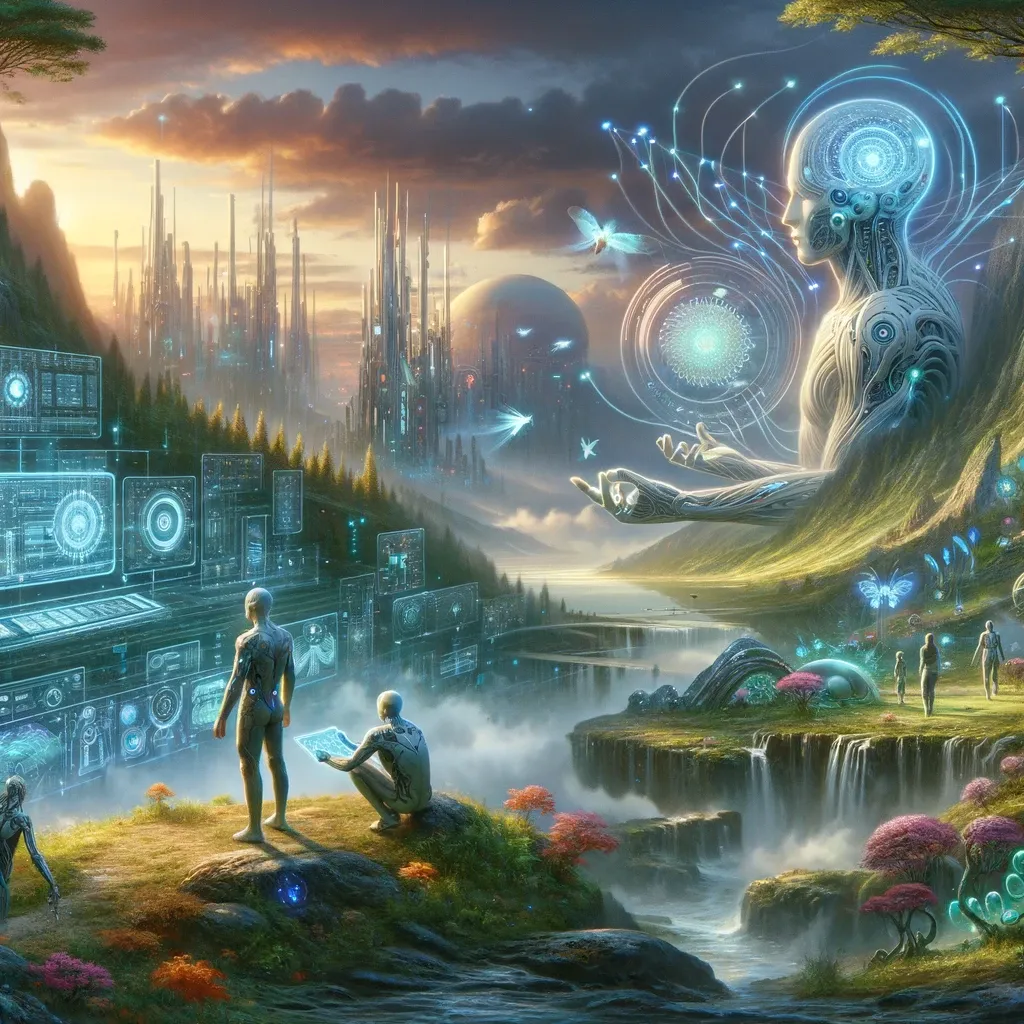Humanity’s New Epoch: The Era of Homo Cyberneticus and Our Evolving Identity
Envision a world where technology is no longer just an adjunct to our lives, but a fundamental component of our very being. We stand at the threshold of the Homo Cyberneticus era, a watershed moment in the annals of human evolution. In this epoch, our entwinement with technology is not

Envision a world where technology is no longer just an adjunct to our lives, but a fundamental component of our very being. We stand at the threshold of the Homo Cyberneticus era, a watershed moment in the annals of human evolution. In this epoch, our entwinement with technology is not merely functional; it redefines the core of what it means to be human. This transition heralds a new chapter in our story, one where the boundaries between organic and synthetic, natural and artificial, are increasingly blurred.
This article sets out to navigate the contours of this transformative era. We will explore how the integration of technology into our biological fabric is not just altering our day-to-day experiences, but is also reshaping our identity at a fundamental level. From neural enhancements to AI-assisted living, the Homo Cyberneticus era promises a radical reimagining of human capabilities, societal structures, and individual consciousness.
As we embark on this journey, we confront profound questions: What does the future hold for a species that is evolving beyond its natural origins? How will our understanding of 'self' adapt as we merge more intimately with our technological creations? This exploration is not just about scientific and technological advancements; it is a quest to understand the future of the human spirit in an age where our destiny is irrevocably intertwined with the digital and the synthetic.
In this new epoch, we are not just witnessing a change in the tools we use, but a transformation in the very fabric of human existence. The Homo Cyberneticus era beckons us to reimagine our place in the universe, as we evolve into a hybrid of our organic heritage and the boundless potential of technology. This article invites you to contemplate this unprecedented transformation, probing the depths of what it means to be human in an age where our biological and technological identities are converging.
The Symbiosis of Human and Machine
In the Homo Cyberneticus era, the symbiosis of human and machine transcends conventional boundaries, creating a tapestry of existence where biology and technology are inextricably linked. This fusion heralds a new paradigm of living, where technology is not an external entity but a part of our biological essence.
The integration begins subtly, with wearable devices that monitor our health and augment our physical capabilities. Gradually, it evolves into more intimate connections, like neural implants that enhance cognitive functions or AI interfaces seamlessly integrated into our senses. These advancements are not just about improving efficiency or health; they are redefining what it means to experience life.
Imagine a world where your thoughts can control machines, where your memories can be digitally stored, or even shared. Consider the possibilities when your senses are amplified beyond natural limits, enabling you to perceive the world in ways previously unimaginable. In this era, the human experience is augmented by a symphony of technological harmonies.
Yet, this symbiosis is not without its complexities. As we become more machine-like, and machines more human-like, the line between the two begins to blur. What does it mean for our identity when our thoughts, emotions, and memories can be digitally manipulated? How do we maintain our humanity when our very essence is intertwined with silicon and code?
The Homo Cyberneticus era does not merely herald a technological revolution; it signals a profound shift in the human condition. We are not just using machines; we are merging with them, creating a new kind of being that is neither entirely human nor entirely machine. This fusion challenges our preconceived notions of existence, pushing us to reconsider our understanding of life, consciousness, and the essence of what it means to be human.
As we navigate this new landscape, we are not just shaping technology; we are reshaping ourselves. The symbiosis of human and machine is not a distant future scenario; it is an unfolding reality, one that is rewriting the story of humanity in real-time. In the Homo Cyberneticus era, we are witnesses and architects of a new dawn, where the fusion of flesh and technology unveils a new horizon of possibilities for what it means to be alive.
Philosophical Depth
The dawn of Homo Cyberneticus ushers in not just technological advancements but profound philosophical quandaries. As we intertwine with technology, the essence of what it means to be human is subject to reexamination. This era compels us to confront deep existential questions, challenging the very foundations of our identity, consciousness, and moral framework.
One fundamental inquiry is the nature of selfhood in the context of technological augmentation. When our thoughts, memories, and sensory experiences can be artificially enhanced or modified, what becomes of the innate, unaltered human experience? This blurring of boundaries between the organic self and the technological other raises critical questions about authenticity and the sanctity of human consciousness.
Moreover, as we enhance our cognitive and physical abilities, we must ponder the implications for individuality and equality. Does the advent of Homo Cyberneticus create a new class of superhumans, widening the divide between the technologically enhanced and the unenhanced? How do we address the ethical implications of such disparities, and what does this mean for our societal values and rights?
The integration of AI into our cognitive processes also poses significant philosophical dilemmas. With AI influencing decision-making and possibly emotions, the autonomy of the human will is brought into question. Are our choices genuinely ours when they are made in tandem with artificial intelligence? This interplay between human volition and machine-driven suggestion opens a Pandora's box of ethical considerations about agency and responsibility.
In this new epoch, the age-old debate about what constitutes consciousness gains a new dimension. The emergence of sophisticated AI and neural interfaces blurs the line between human consciousness and artificial sentience. This leads to existential pondering about life, awareness, and the potential for a new form of consciousness that is neither purely biological nor purely artificial.
The Homo Cyberneticus era, therefore, is as much a philosophical revolution as it is a technological one. It challenges us to redefine our understanding of humanity, prompting a reevaluation of our deepest beliefs about existence, identity, and the nature of reality itself. As we navigate this brave new world, our philosophical perspectives must evolve alongside our technological advancements, ensuring that we retain the essence of what makes us human even as we transcend our biological limitations.
Rich in Information and Research
The Homo Cyberneticus era is grounded in a wealth of scientific advancements and research that paint a picture of a future where human and machine not only coexist but are coalescent. This section delves into the latest findings and expert opinions from various fields, providing a solid foundation for understanding the complexities and potential of this new epoch.
Advancements in Biotechnology and Genetics
Biotechnology and genetic engineering are at the forefront of bridging the gap between human capabilities and technological enhancements. CRISPR-Cas9, a revolutionary gene-editing technology, has opened doors to correcting genetic defects and potentially enhancing human traits. Research in this area continues to explore the possibilities of eliminating diseases, extending human lifespan, and even augmenting physical and cognitive abilities.
Neuroscience and Neural Interfaces
Neural interface technology, like Elon Musk's Neuralink, is making strides in connecting the human brain directly to computers. These interfaces hold the promise of enhancing brain functions, including memory, sensory input, and even thought communication. Recent studies show significant progress in using neural interfaces for treating neurological disorders and improving quality of life for individuals with disabilities.
Artificial Intelligence and Machine Learning
AI and machine learning are integral to the Homo Cyberneticus concept, offering unprecedented capabilities in data processing, pattern recognition, and decision-making. Research in AI ethics and human-AI interaction is also gaining momentum, addressing concerns about bias, autonomy, and the future of human employment in the face of intelligent automation.
Cybernetics and Robotics
Advances in cybernetics and robotics are blurring the lines between humans and machines. Prosthetics are evolving from mere replacements for lost limbs to advanced extensions that provide enhanced functionalities. Robotics, combined with AI, is paving the way for humanoid robots and AI companions that could redefine human relationships and societal structures.
Ethical, Legal, and Social Implications
Accompanying these technological advances are extensive studies on their ethical, legal, and social implications. Researchers and ethicists are actively debating topics like the right to cognitive liberty, privacy concerns in an age of neural data, and the socio-economic impacts of human enhancement technologies.
In summary, the Homo Cyberneticus era is not a speculative fiction but a reality being shaped by current research and innovations. This body of work provides a rich tapestry of information, from which we can begin to understand the future of human evolution. As we stand on the brink of this new epoch, it is crucial to stay informed and engaged with the latest developments, ensuring that our journey into the future is guided by knowledge, ethics, and a commitment to the betterment of humanity.




